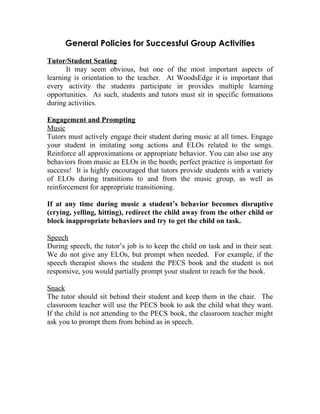Report
Share

More Related Content
What's hot
What's hot (20)
3.2 the development of teaching competences els_pc_5

3.2 the development of teaching competences els_pc_5
Viewers also liked
Viewers also liked (10)
Similar to General policies for group activities
Similar to General policies for group activities (20)
TEFL Group 3 - Describing Teachers (Roles of Teachers, Characteristics of a G...

TEFL Group 3 - Describing Teachers (Roles of Teachers, Characteristics of a G...
STIMULUS VARIATION SKILL MICRO TEACHING SKILL.pptx

STIMULUS VARIATION SKILL MICRO TEACHING SKILL.pptx
Approach and Methods in TESOL-The Designer Methods

Approach and Methods in TESOL-The Designer Methods
More from Prepracticum
More from Prepracticum (17)
General policies for group activities
- 1. General Policies for Successful Group Activities Tutor/Student Seating It may seem obvious, but one of the most important aspects of learning is orientation to the teacher. At WoodsEdge it is important that every activity the students participate in provides multiple learning opportunities. As such, students and tutors must sit in specific formations during activities. Engagement and Prompting Music Tutors must actively engage their student during music at all times. Engage your student in imitating song actions and ELOs related to the songs. Reinforce all approximations or appropriate behavior. You can also use any behaviors from music as ELOs in the booth; perfect practice is important for success! It is highly encouraged that tutors provide students with a variety of ELOs during transitions to and from the music group, as well as reinforcement for appropriate transitioning. If at any time during music a student’s behavior becomes disruptive (crying, yelling, hitting), redirect the child away from the other child or block inappropriate behaviors and try to get the child on task. Speech During speech, the tutor’s job is to keep the child on task and in their seat. We do not give any ELOs, but prompt when needed. For example, if the speech therapist shows the student the PECS book and the student is not responsive, you would partially prompt your student to reach for the book. Snack The tutor should sit behind their student and keep them in the chair. The classroom teacher will use the PECS book to ask the child what they want. If the child is not attending to the PECS book, the classroom teacher might ask you to prompt them from behind as in speech.